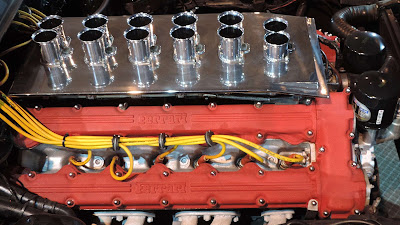Forgotten LEGEND After some time ago we posted an article that discussed the 1965 Pontiac Banshee I aka XP-833, along with its other siblings (noted up to the 1988 Pontiac Banshee IV). And this time we will discuss about another car concept of the mentioned brand that is no less exciting, called the Pontiac Pegasus Concept.
 |
| This is the Pontiac Pegasus Concept was built as a "design concept" study from a production 1970 Pontiac Firebird. (Picture from: CarBibles) |
 The name of this concept car is basically a combined depiction of the Firebird and a horse. It's unknown whether it has anything to do with the Ferrari which also known with its 'Prancing Horse' emblem. The result is the legendary mythical winged horse, Pegasus. There was not only a custom Pegasus logo on the grill but a Porsche-esque coat of arms on the hood.
The name of this concept car is basically a combined depiction of the Firebird and a horse. It's unknown whether it has anything to do with the Ferrari which also known with its 'Prancing Horse' emblem. The result is the legendary mythical winged horse, Pegasus. There was not only a custom Pegasus logo on the grill but a Porsche-esque coat of arms on the hood. |
| Here's an V12 engine of the Ferrari 365 GTB/4 resides under the hood of the Pontiac Pegasus Concept. (Picture from: CarBibles) |
So if your minds immediately related this Pegasus figure to the Pontiac Firebird, you are on the right track. Reportedly, the original sketch came from Jerry Palmer, who was being test Ferrari-inspired design features at the time for later applied to a Chevy model.
 |
| The Pontiac Pegasus Concept inspired by Ferrari designs ranging from the front end, grille and fender vents. (Picture from: Cars and Adventures) |
Before this can be realized, the GM's VP of Design, William "Bill" Mitchell then turned those ideas, and built to take the styling of the upcoming production 1970 Pontiac Firebird. As we can see, the most prominent of Ferrari's design could be found in the front nose and fender vents. However, it is not like many design concepts, this design study also includes the powertrain sector.
 |
| Not only powered by Ferrari V12 engine, the Pontiac Pegasus Concept also featured with Ferrari's instrument panel gauges included the exhaust system, and mufflers. (Picture from: Cars and Adventures) |
As quoted of GM Heritage, Enzo Ferrari was donated a V12 engine of the Ferrari 365 GTB/4 paired with its 5-speed manual transmission system. Can You believed this? It seems that's impossible if Il Commendatore is willing to be kind to his rival, an American automaker. However, what is impossible in this world? Furthermore, the exhaust system, mufflers and instrument panel are also taken from Ferrari, but the rear axle is a GM traction unit, while the brakes are from Corvette and the wheels are from Borrani.
 |
| Not only powered by Ferrari V12 engine, the Pontiac Pegasus Concept also featured with Ferrari's instrument panel gauges included the exhaust system, and mufflers. (Picture from: CarBibles) |
As quoted of Cars and Adventures, the car itself has many interesting design elements. Including a racing-inspired gas cap on the trunk area of the car. (this design was also included on the 1974 Pontiac Banshee III Concept Car). There were also fog lights, which could be a nod to the car’s European influence. Despite the European influence, a uniquely American design touch is featured on the car.
 |
| Meanwhile the Pontiac Pegasus Concept's legs equiped with Borani's wire wheels with many other interesting design elements such as racing-inspired gas cap on the trunk area of the car. (Picture from: MotorBiscuit) |
Much like the Firebird Formulas and the 1969 Trans Am, the Pegasus features an air cleaner inside the hood itself, taking advantage of the cold air available. In perhaps a nod to racing rules dating from before the car was made, there was a full-sized spare tire prominently displayed in the back of the car under the rear glass.
 In our opinion, the Pegasus is a passion project with real-world bearings, from a time when GM was the largest manufacturer on the planet, and the future of cars and how they would perform was in doubt. Unfortunately, this car never made it through the concept phase, and now resides at the GM Heritage Center, where it's expected to live forever. *** [EKA FROM VARIOUS SOURCES | GM | CARBIBLES | CARS AND ADVENTURES | MOTORBISCUIT ]
In our opinion, the Pegasus is a passion project with real-world bearings, from a time when GM was the largest manufacturer on the planet, and the future of cars and how they would perform was in doubt. Unfortunately, this car never made it through the concept phase, and now resides at the GM Heritage Center, where it's expected to live forever. *** [EKA FROM VARIOUS SOURCES | GM | CARBIBLES | CARS AND ADVENTURES | MOTORBISCUIT ]Note: This blog can be accessed via your smart phone
